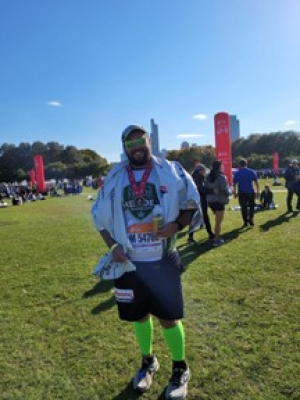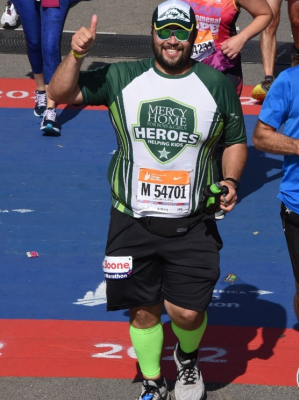I knew running a marathon wouldn’t be easy. But there are so many unexpected challenges that arise along the way.
1. Your Fellow Runners Will Be A Diverse Group
- If you are contemplating running a marathon but don’t feel you have “the body” of a marathoner, do not worry. My corral had people of all ages, sizes, cultural backgrounds, and experience levels. There was even a service dog running in my corral! I was with many first-timers like myself and experienced running veterans. Some ran just for the thrill, some to complete a challenge, and some for personal/charitable reasons. This alone was inspiring, to know that you did not have to be a specific type of person to complete a marathon.
2. You Need A Plan. And You Will Need To Be Committed For The Long Haul.
- You cannot just decide to do a marathon on a whim. Training plans can vary but often last about 18 weeks. This meant my training officially began in early June for the October 9 marathon. And even before that, my group recommended a mini 6-week base building plan prior to the early-June start date.
- This long plan also means you cannot give up or take a few weeks off. Yes, setbacks will happen. Life can get in the way, and injuries or illnesses may occur that will force you to rest temporarily. You may need to seek out a physical therapist in your area during your training if this happens, so you can quickly address the issue and safely resume your training.
3. You Will Probably Fail At One Of Your Long Runs.
- You can also expect to run 40+ miles in a week at the peak of your plan. Most plans incorporate one long run each week, which ranges from 6-20 miles. The long run will build each week, with a few tapers down along the way. If you’ve never run this kind of distance before, you will probably burn out or get overwhelmed during at least one of your runs.
4. But Remember, You’re Mostly Competing Against Yourself.
- I had a goal finish time, but I realized part-way through training that it simply wouldn’t be realistic. Running at the pace I had in mind to achieve my goal time, I failed at my long runs (see above). I could not accomplish that particular pace for more than 10 miles, so I knew there was no way I could realistically maintain it for 26.2 miles. Surprisingly, I started running better when I focused less on a certain pace/finish time. I changed my goal to simply completing the race and having fun.
5. You’re Going to Need Some Help Along the Way (Especially If You’re a First-Timer).
- I did most of my weekly runs solo or with a neighbor. But in the long runs, I did most of those with a group. My charity partnered with a run group I met with on Saturdays for the long runs. It was beneficial, especially in the final half of my plan, to do the long runs of 12-20 miles with a group of supportive people rather than solo. We all kept each other motivated and moving forward.
- As stated before, injuries may occur. Even if you have a small pain or issue, it is best to have that quickly addressed so you can resume training as soon as possible and to avoid having that small issue evolve into a more serious one.
6. You Will Probably Dread Running. and at Some Point, You Will Tell Yourself You Will Never Do This Again.
- The long runs and the training plan, in general, can get overwhelming. You may want to give up on yourself when you’ve been running for months. This is when the power of the group comes in handy. Talk to someone else doing the race. Join a running Facebook group (or a specific group for your marathon), and I guarantee others are probably feeling the same as you. Just keep going. You’ve already signed up and started training – not the time to quit!
7. On Race Day, Don’t Start Out Too Fast.
- The most common piece of advice I got from experienced runners was not to start out too fast. Especially on race day, new runners get “caught in the moment” and can sometimes have an adrenaline-fueled personal record for their first few miles on race day, only to “hit the wall” and burn out for the remainder of the marathon. I remembered this piece of advice, and I was able to maintain a fairly consistent pace throughout the day. I, unfortunately, saw many others do what these experienced runners warned me about. I saw and met many people in the first 5 miles that eventually sped ahead of me, only to be walking and done with the race during the last 5 miles. I am thankful for all those that cautioned me.
8. You Can Walk
- Unless you are trying to achieve a Boston Qualifying time, you may walk during the marathon at some point. I found it beneficial to walk during aid stations to lower my heart rate a bit and to avoid potentially choking on liquids & gels. And there is nothing wrong with walking during the marathon – you will see many others doing the same. In fact, many will follow a run/walk program to complete the race, such as this popular one by Jeff Galloway (https://www.runtothefinish.com/galloway-method-run-walk-marathon/). Some even suggest that the run/walk method can lead to a lower risk of injury.
9. You Will Be Amazed By The Support On The Course.
- I met so many people during my race. I would use fellow runners on the course to pace myself, and I found out after the race that others were using me as their pacer. Moreover, Chicago has constant crowd support throughout most of the 26.2 miles. Very rarely will you encounter a stretch of the course with no people.
10. You’ll Want to Do It Again.
- Now that I have completed the task, I am thankful for the time off from my training plan. But I hope to give it a shot again in the future.
Don’t Go Through This Alone
The key takeaway from my experience is to not go through this alone, especially your first time. You will need others to help support, inspire, or cheer you on. And when injuries arise, you can always turn to an Athletico near you to get back on your training plan and to the finish line. Even if you have a small issue during training, it is best to address it before it becomes more serious. If you’re pressed for time with all that running, you can always try a Virtual Free Assessment, Home Therapy, or Telehealth.
*Per federal guidelines, beneficiaries of plans such as Medicare, Medicaid, Tricare, VHA and other federally funded plans are not eligible for free assessments.
The Athletico blog is an educational resource written by Athletico employees. Athletico bloggers are licensed professionals who abide by the code of ethics outlined by their respective professional associations. The content published in blog posts represents the opinion of the individual author based on their expertise and experience. The content provided in this blog is for informational purposes only, does not constitute medical advice and should not be relied on for making personal health decisions.
Clinton Boone is a physical therapist who enjoys treating various orthopedic conditions and vestibular disorders. Clint enjoys spending time with family, lifting weights, and running in his spare time – having just completed the Chicago Marathon in 2022. Clint works and lives in Manhattan, IL, and loves treating members of his local community. He can be reached at clinton.boone@athletico.com if you have any questions or comments.

 width="900"
height="356"
>
width="900"
height="356"
>


